Abstract
1. Fotetal plasma vasopressin levels were measured by bio-assay in chronically catheterized sheep from 110 to 145 days gestation. 2. In foetuses in good condition resting circulating vasopressin concentrations were generally undetectable (less than 5 micromicron./ml.). In 15% of the samples low concentrations (5-10 micromicron./ml.) were observed. 3. Hypoxaemia in the foetus was caused by allowing the ewe to breathe 9% O2-3% CO2 in N2 for 1 hr. Plasma vasopressin levels rose in the foetus to 119 +/- 32 micromicron./ml., whereas the hormone levels in the ewe were not routinely increased. In the foetus, the rise in plasma vasopressin levels was significantly related to the fall in pH and Pa, O2 during the hypoxia. 4. In foetuses in which the cervical vagosympathetic trunks were cut, the rise in plasma vasopressin levels (to 48 +/- 25 micromicron./ml.) during hypoxaemia was less than in intact foetuses. The increase was related only to the fall in arterial pH and the regression coefficient was less than in intact foetuses. 5. During hypoxaemia arterial pressure rose and heart rate fell in the normal foetuses. The rise in arterial pressure was greatest when the plasma vasopressin concentration was highest. 6. Spontaneous episodes of hypoxaemia (Pa, O2 less than 15 mmHg) and/or acidaemia (pH less than 7.30) occurred in four intact foetuses and four foetuses in which the cervical vagosympathetic trunks were cut; all of the latter lambs died in utero. Plasma vasopressin levels were elevated and the concentrations were inversely related to arterial pH. 7. Intravenous infusions of vasopressin to foetuses increased plasma vasopressin levels to 6-202 micromicron./ml.; the rate of clearance of the hormone was three times that in adult ewes. There was a large increase in arterial pressure and bradycardia. The hypertensive effects of vasopressin were relatively much greater in the foetus than in adult ewes.
Full text
PDF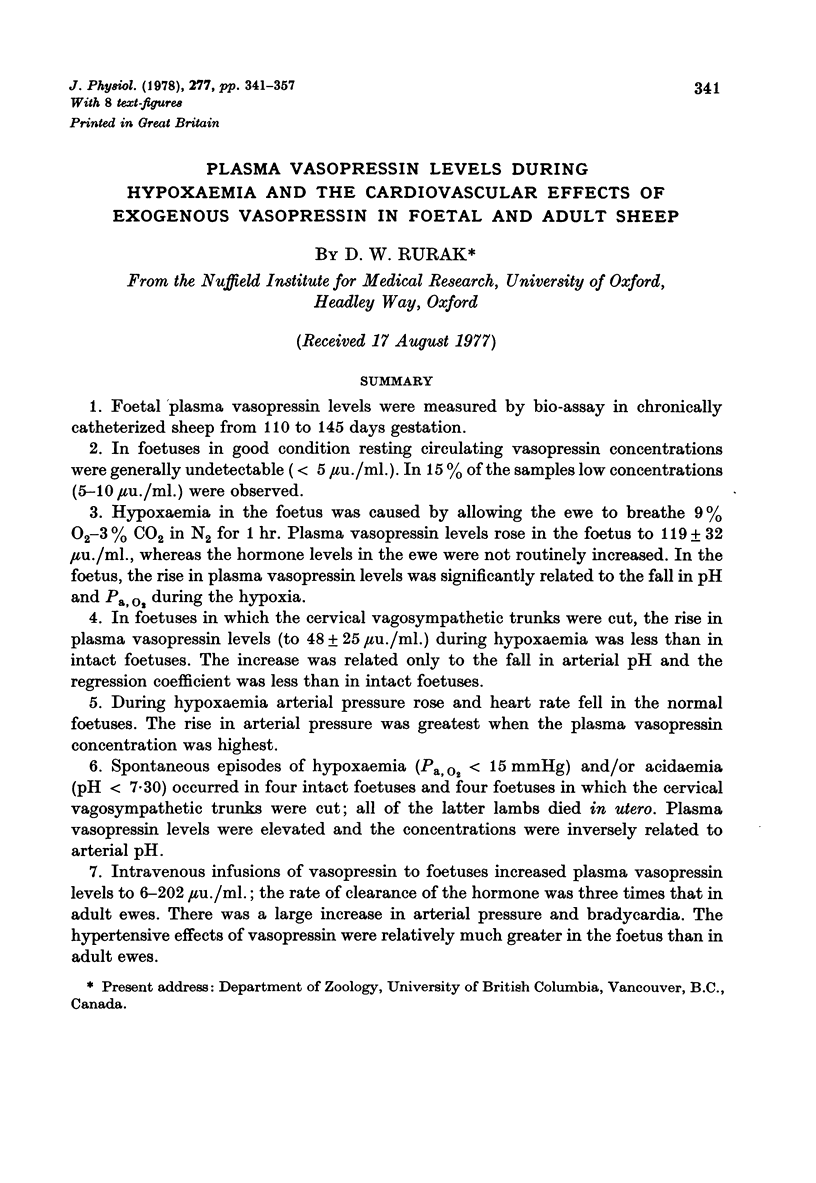
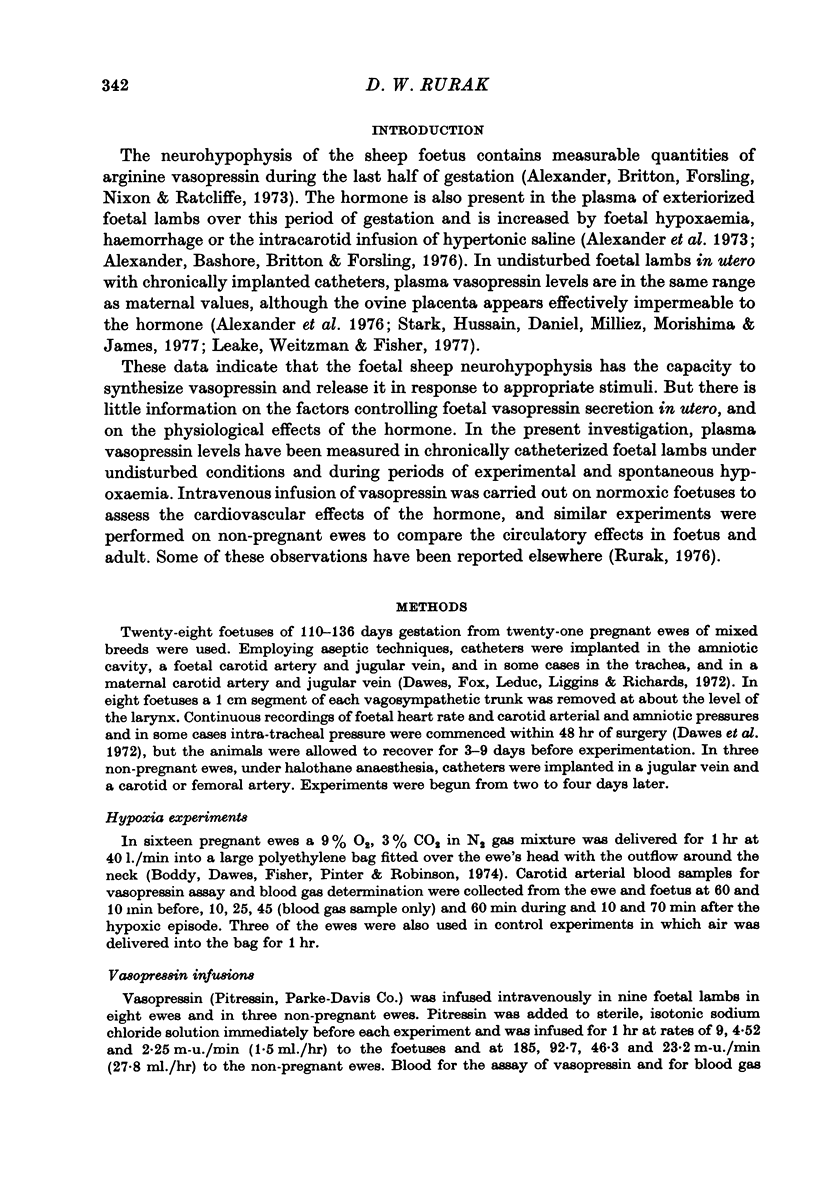
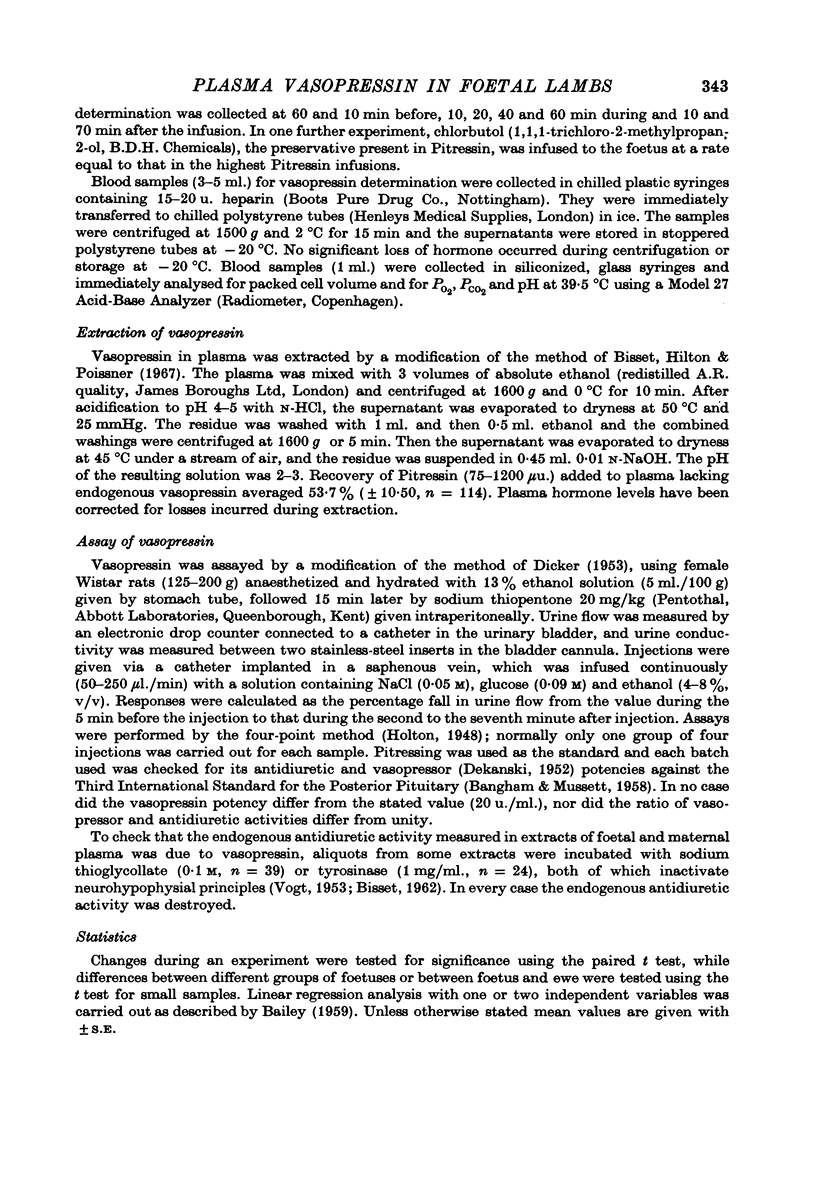
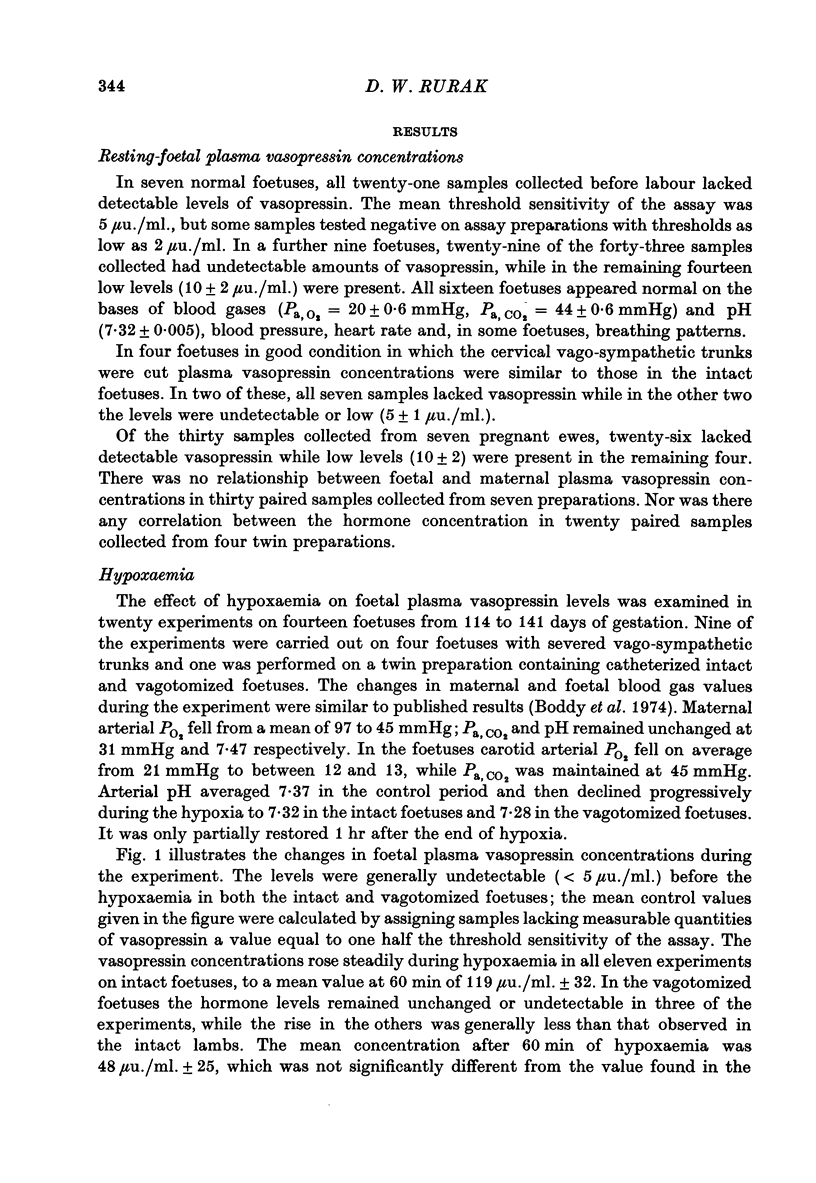
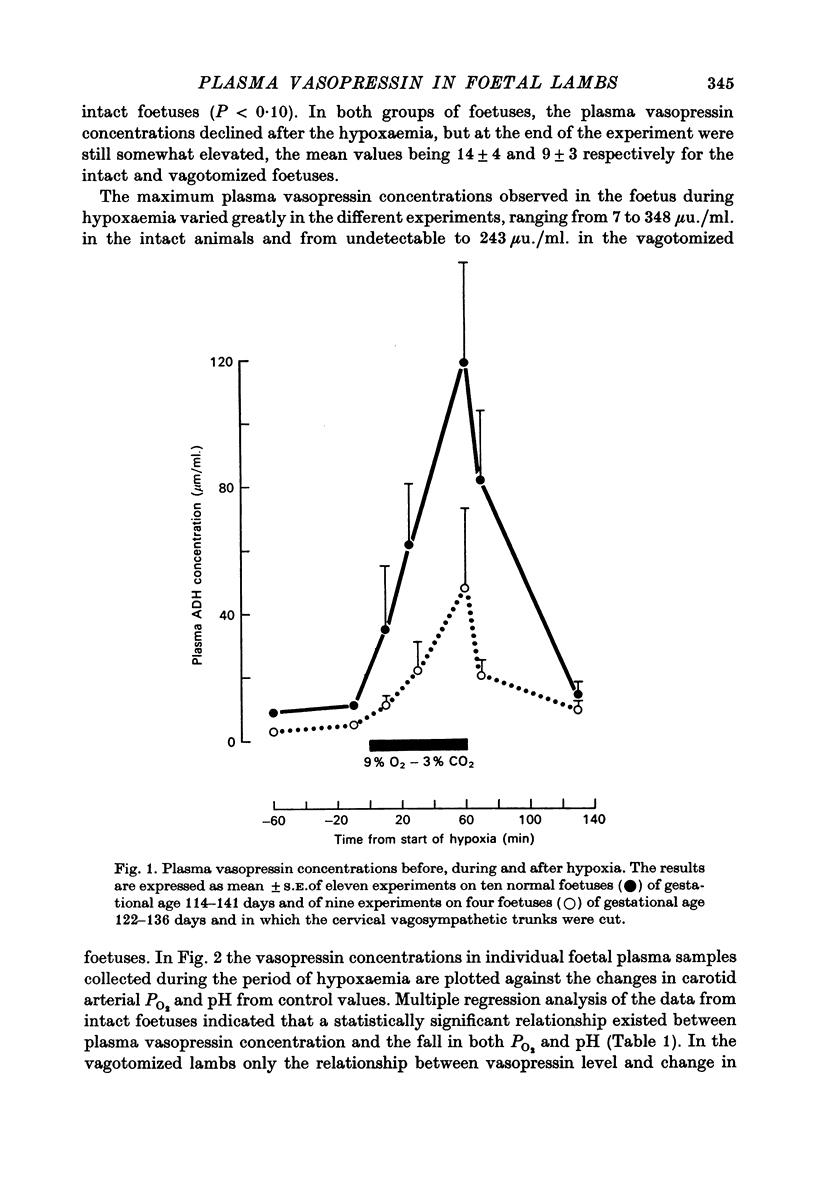
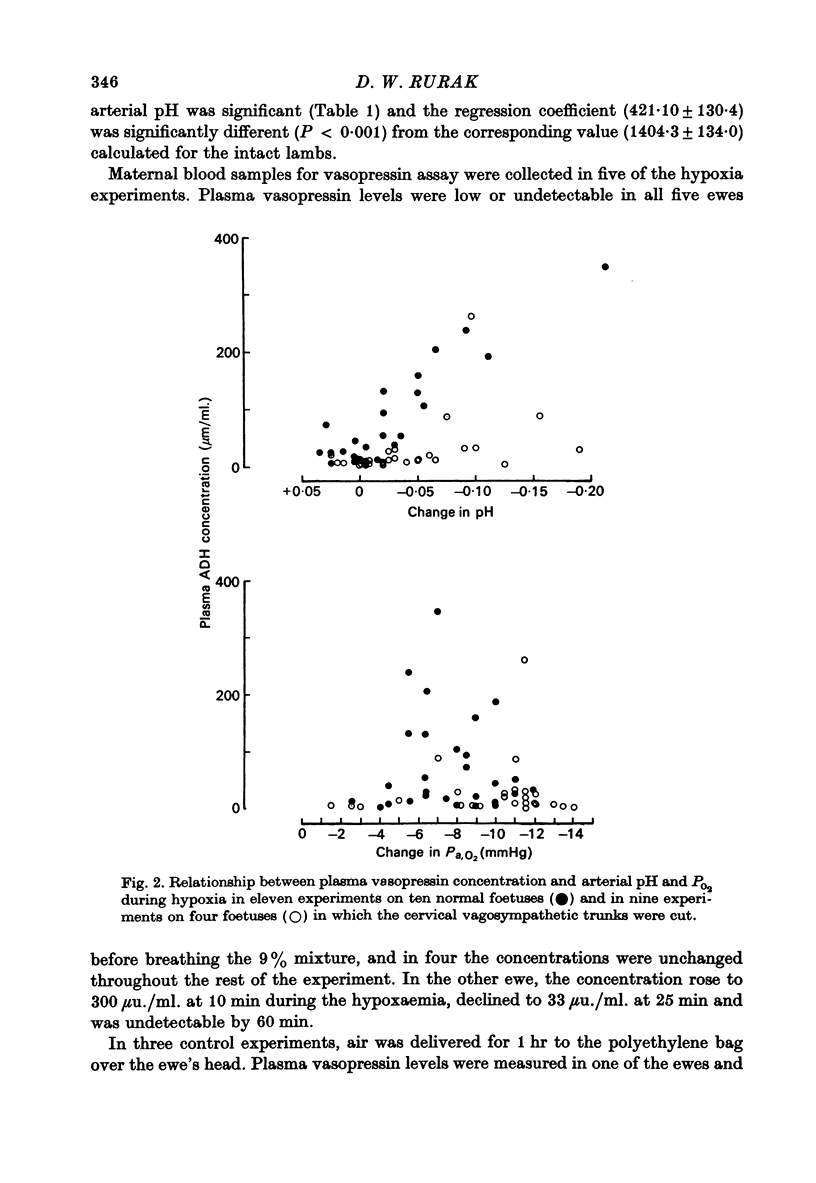
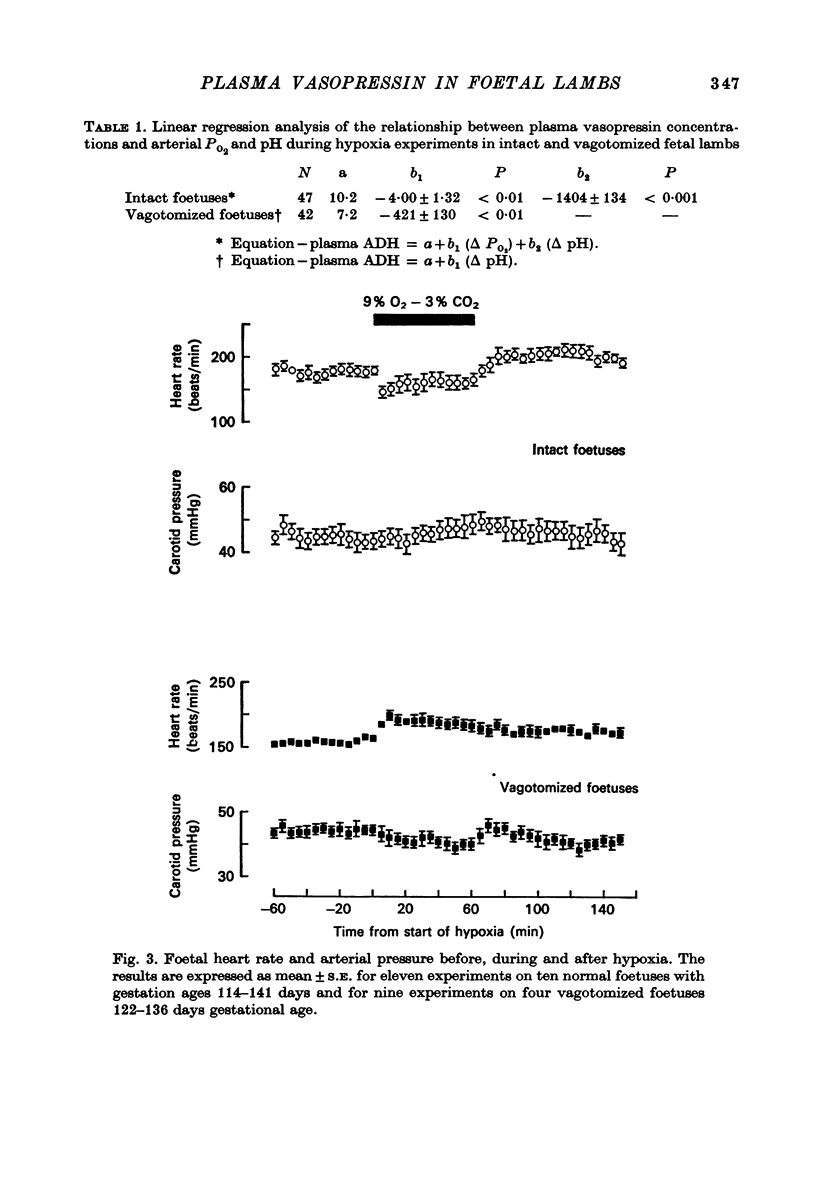
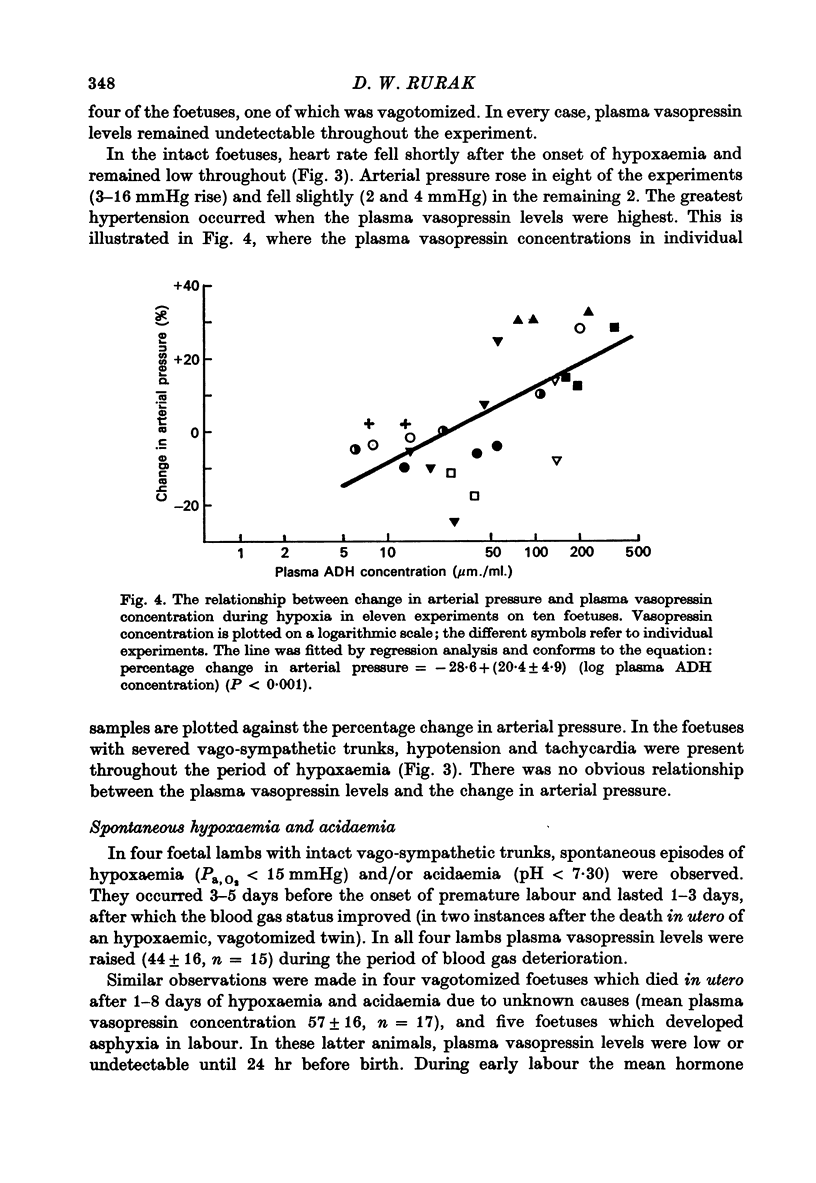
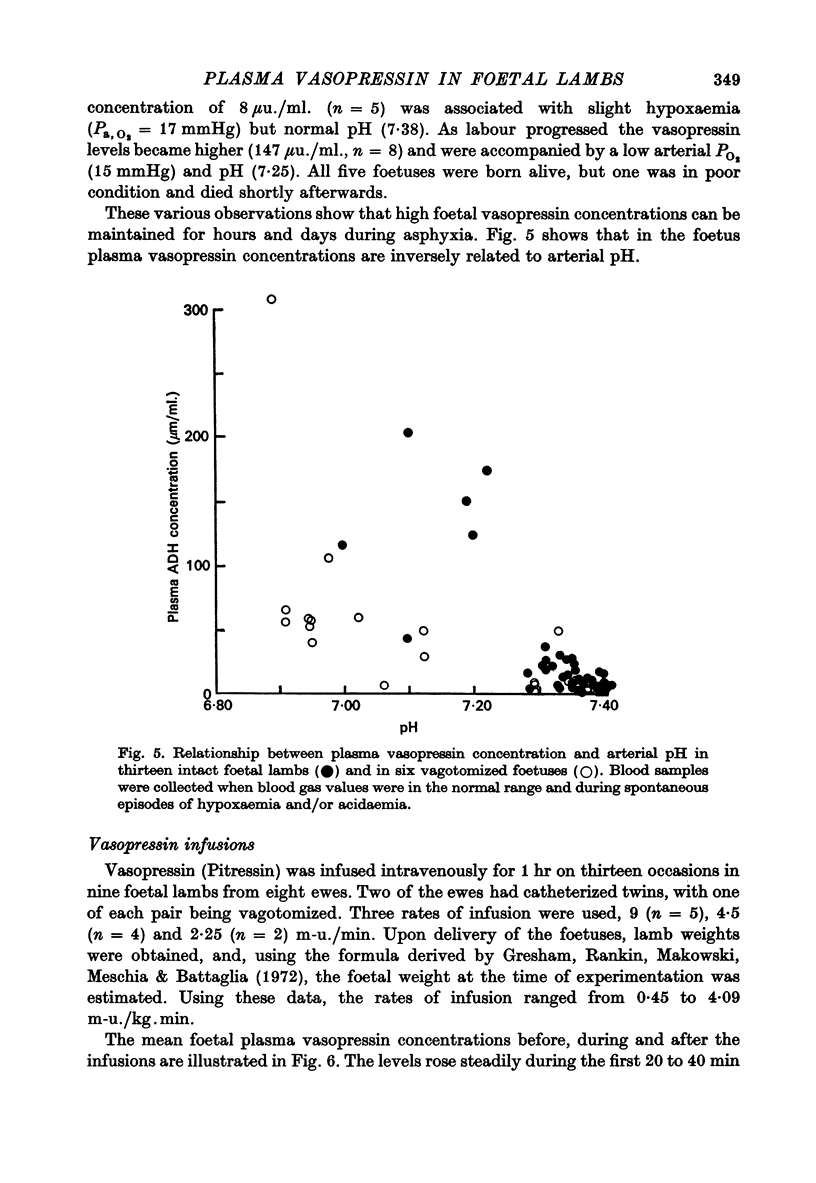
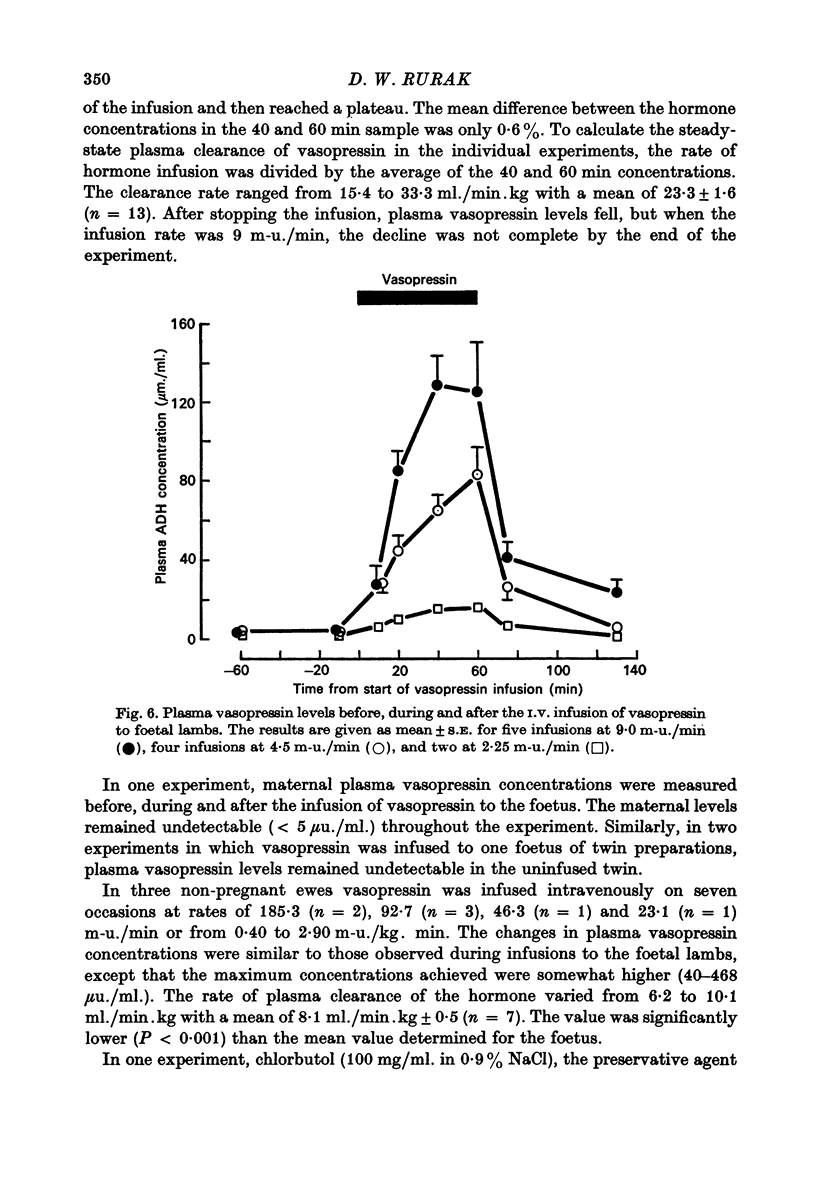
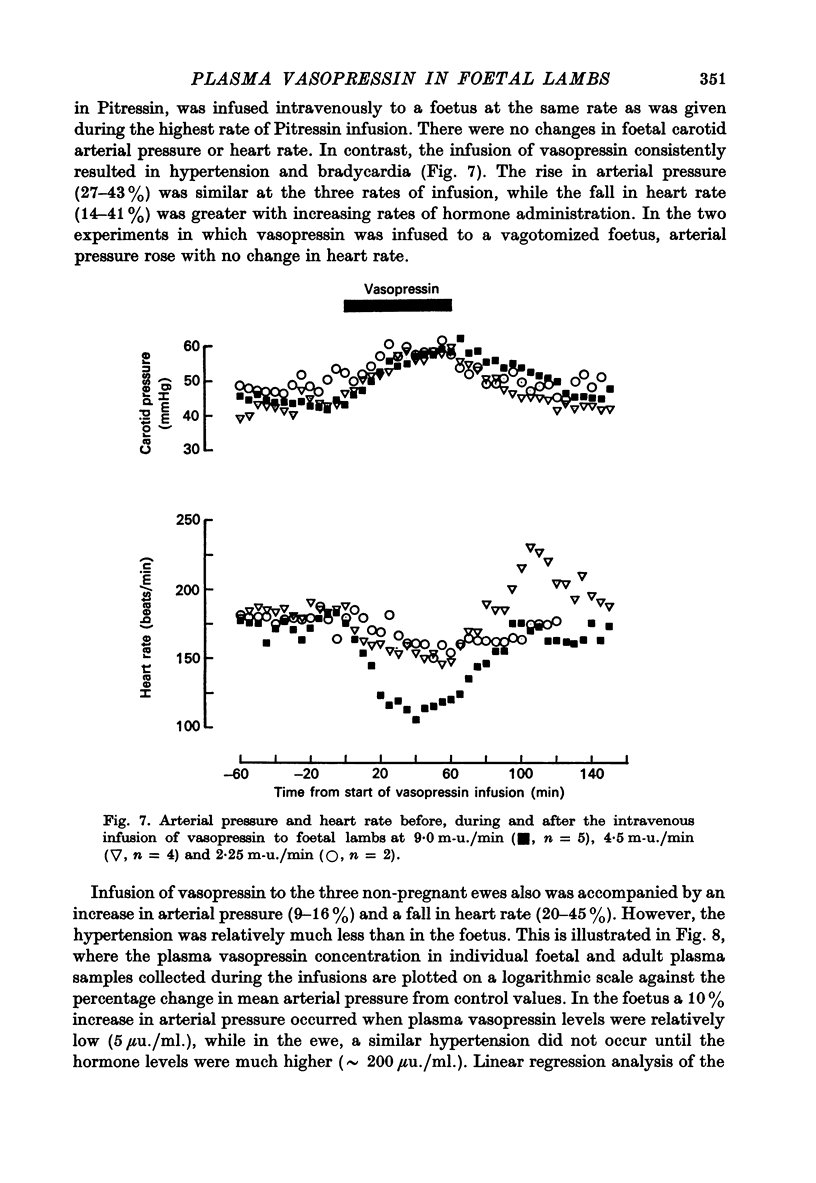
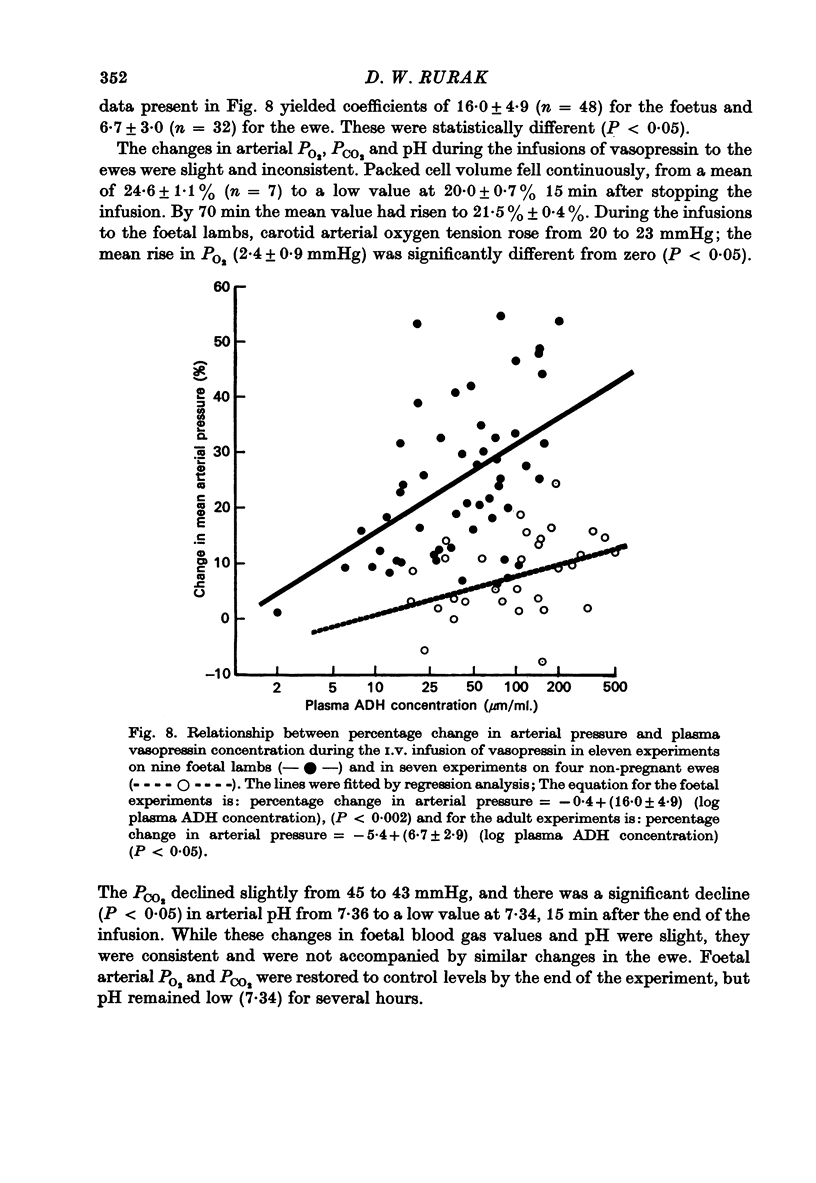
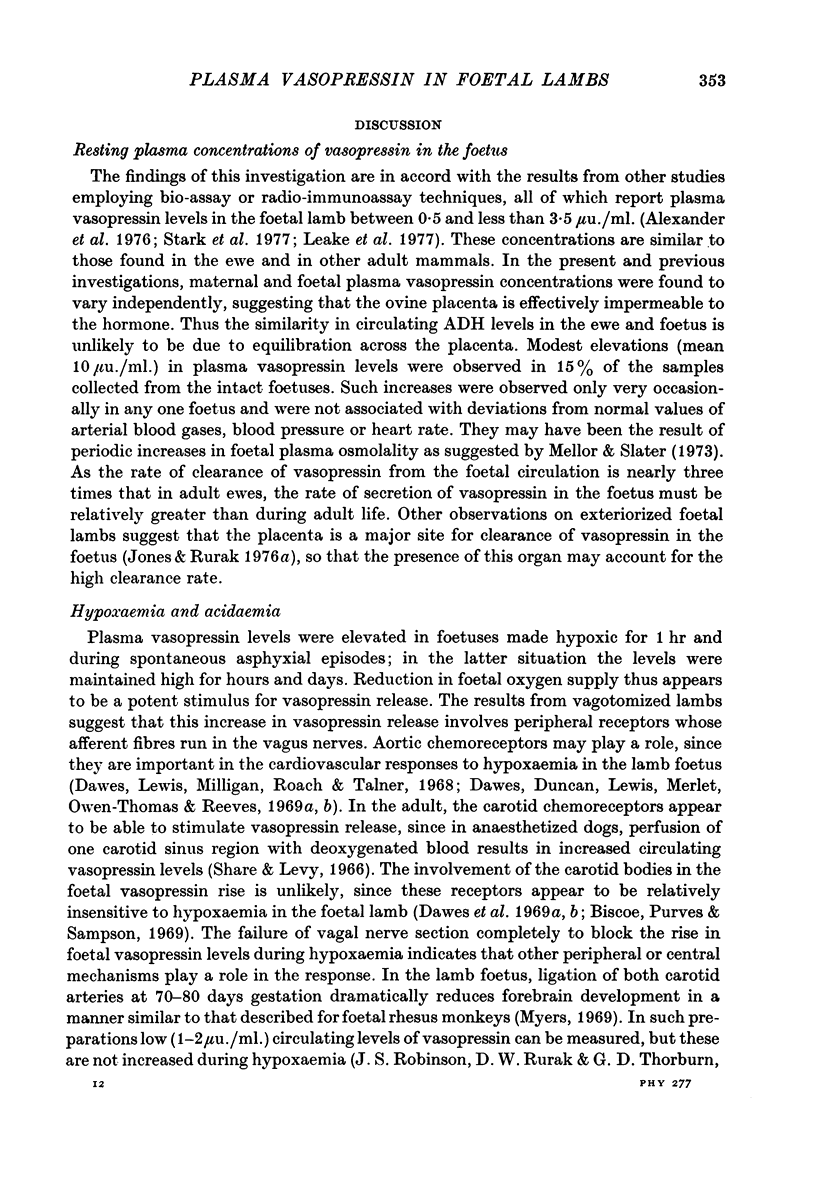
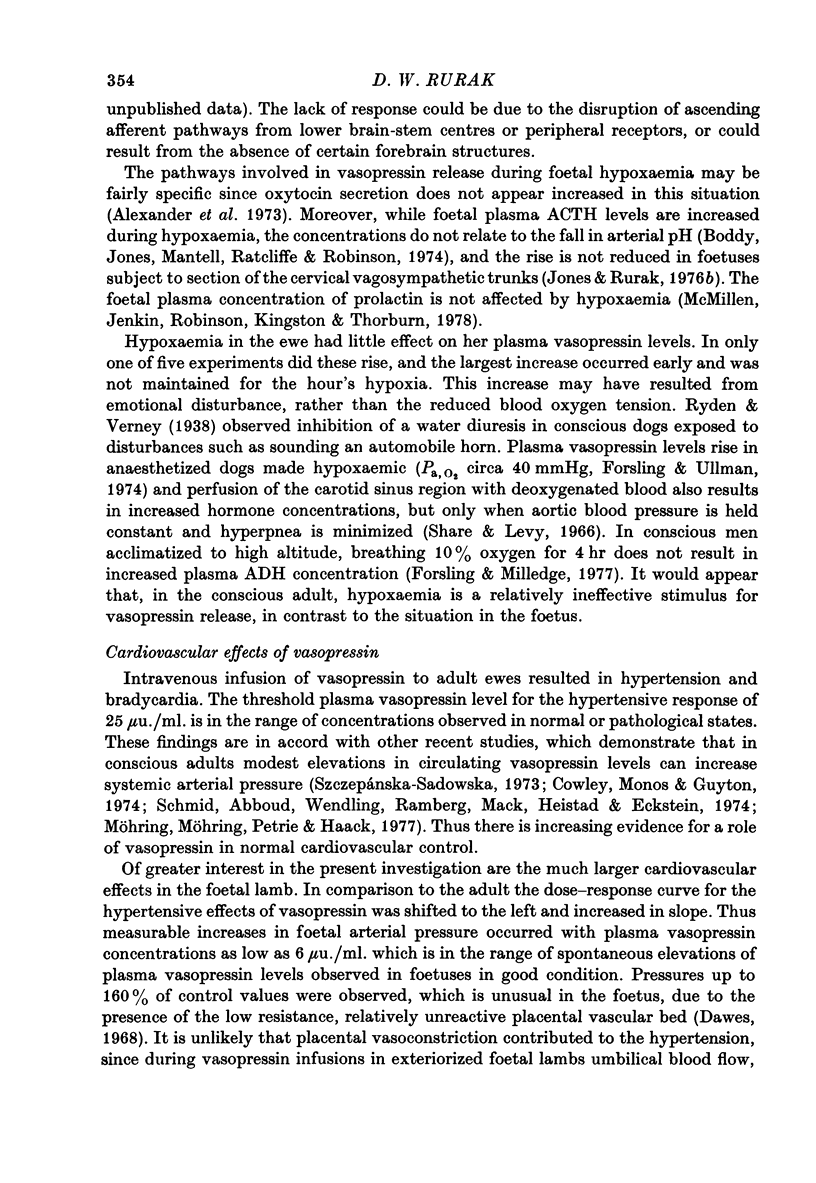
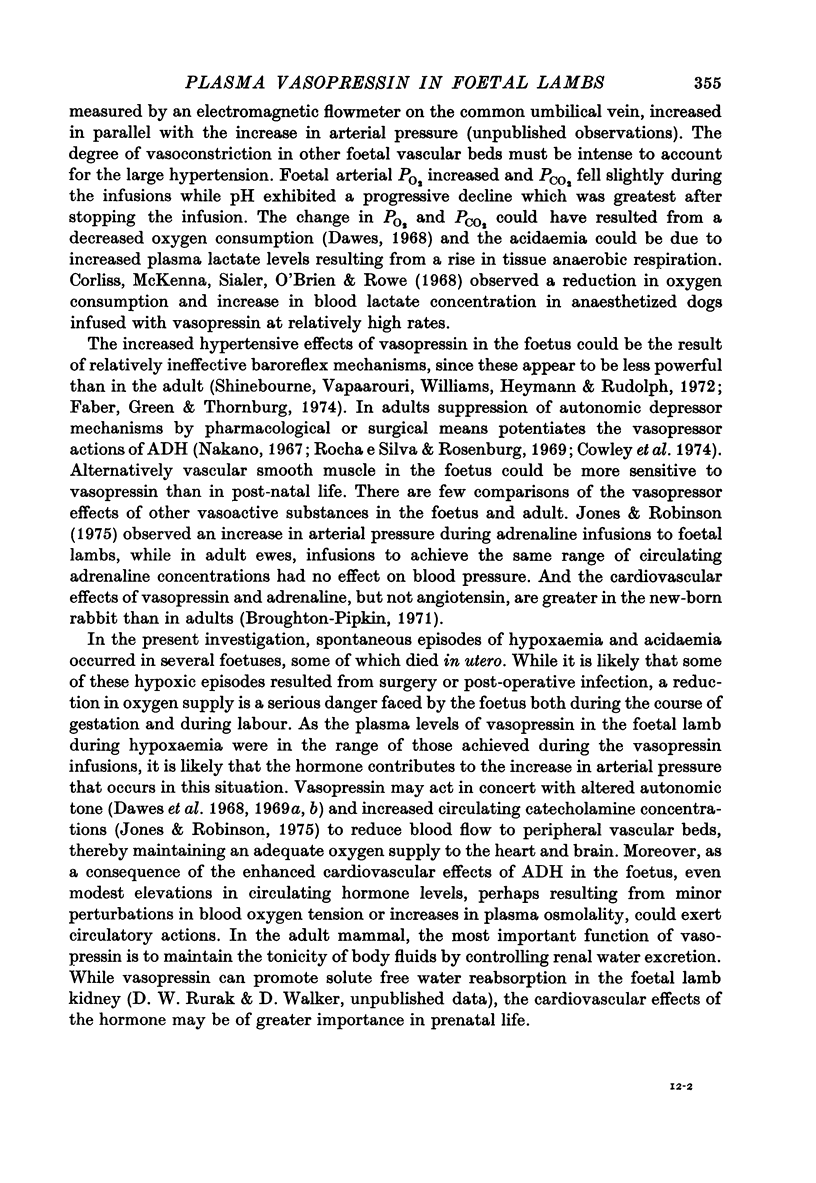
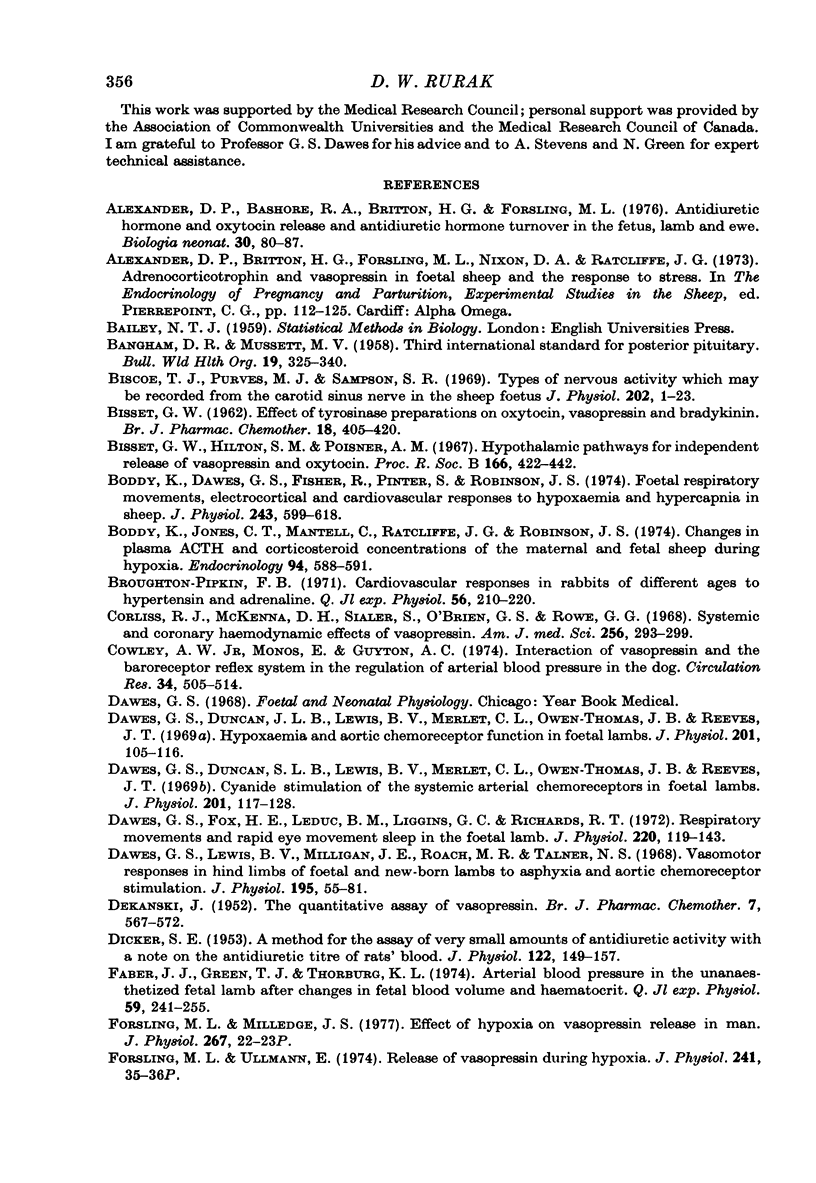
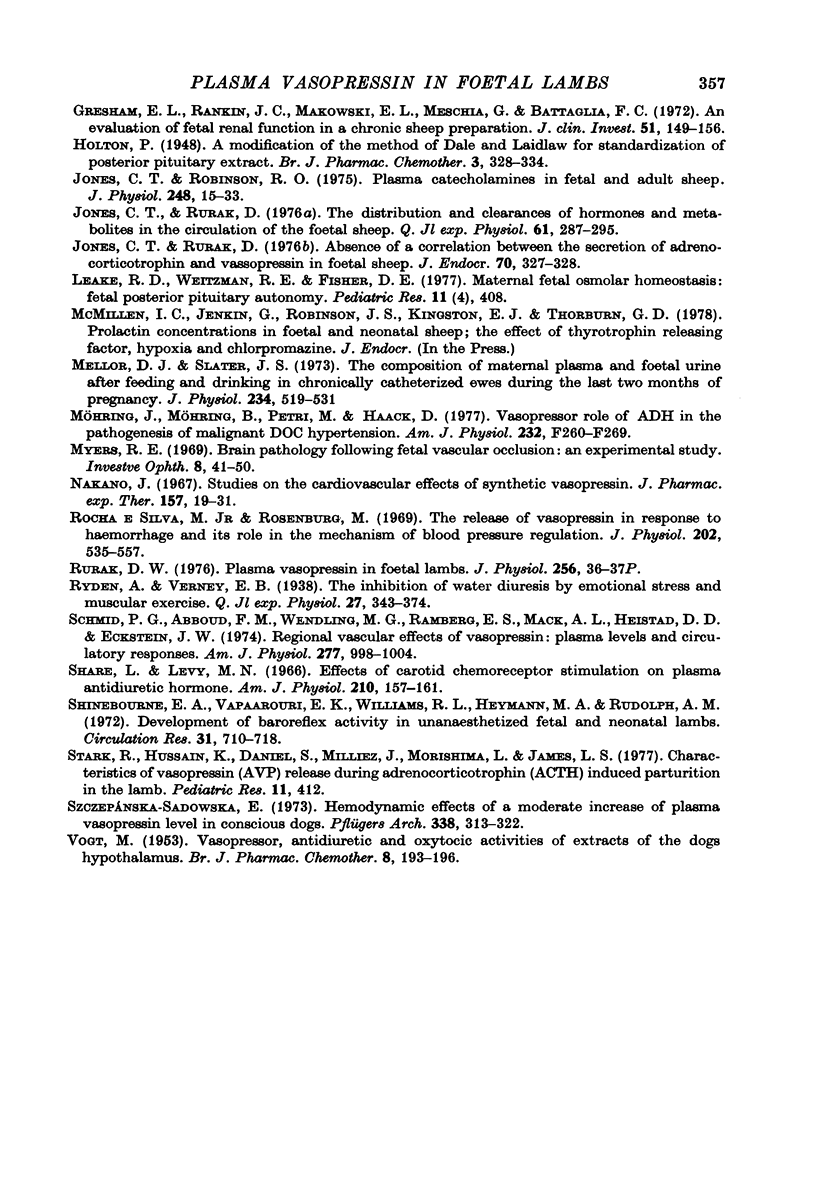
Selected References
These references are in PubMed. This may not be the complete list of references from this article.
- BANGHAM D. R., MUSSETT M. V. Third international standard for posterior pituitary; re-named third international standard for oxytocic, vasopressor and antidiuretic substances in 1956. Bull World Health Organ. 1958;19(2):325–340. [PMC free article] [PubMed] [Google Scholar]
- BISSET G. W. Effect of tyrosinase preparations on oxytocin, vasopressin and bradykinin. Br J Pharmacol Chemother. 1962 Apr;18:405–420. doi: 10.1111/j.1476-5381.1962.tb01420.x. [DOI] [PMC free article] [PubMed] [Google Scholar]
- Biscoe T. J., Purves M. J., Sampson S. R. Types of nervous activity which may be recorded from the carotid sinus nerve in the sheep foetus. J Physiol. 1969 May;202(1):1–23. doi: 10.1113/jphysiol.1969.sp008792. [DOI] [PMC free article] [PubMed] [Google Scholar]
- Boddy K., Dawes G. S., Fisher R., Pinter S., Robinson J. S. Foetal respiratory movements, electrocortical and cardiovascular responses to hypoxaemia and hypercapnia in sheep. J Physiol. 1974 Dec;243(3):599–618. doi: 10.1113/jphysiol.1974.sp010768. [DOI] [PMC free article] [PubMed] [Google Scholar]
- Boddy K., Jones C. T., Mantell C., Ratcliffe J. G., Robinson J. S. Changes in plasma ACTH and corticosteroid of the maternal and fetal sheep during hypoxia. Endocrinology. 1974 Feb;94(2):588–591. doi: 10.1210/endo-94-2-588. [DOI] [PubMed] [Google Scholar]
- Corliss R. J., McKenna D. H., Sialer S., O'Brien G. S., Rowe G. G. Systemic and coronary hemodynamic effects of vasopressin. Am J Med Sci. 1968 Nov;256(5):293–299. doi: 10.1097/00000441-196811000-00003. [DOI] [PubMed] [Google Scholar]
- Cowley A. W., Jr, Monos E., Guyton A. C. Interaction of vasopressin and the baroreceptor reflex system in the regulation of arterial blood pressure in the dog. Circ Res. 1974 Apr;34(4):505–514. doi: 10.1161/01.res.34.4.505. [DOI] [PubMed] [Google Scholar]
- DEKANSKI J. The quantitative assay of vasopressin. Br J Pharmacol Chemother. 1952 Dec;7(4):567–572. doi: 10.1111/j.1476-5381.1952.tb00723.x. [DOI] [PMC free article] [PubMed] [Google Scholar]
- DICKER S. E. A method for the assay of very small amounts of antidiuretic activity with a note on the antidiuretic titre of rat's blood. J Physiol. 1953 Oct;122(1):149–157. doi: 10.1113/jphysiol.1953.sp004986. [DOI] [PMC free article] [PubMed] [Google Scholar]
- Dawes G. S., Duncan S. L., Lewis B. V., Merlet C. L., Owen-Thomas J. B., Reeves J. T. Cyanide stimulation of the systemic arterial chemoreceptors in foetal lambs. J Physiol. 1969 Mar;201(1):117–128. doi: 10.1113/jphysiol.1969.sp008746. [DOI] [PMC free article] [PubMed] [Google Scholar]
- Dawes G. S., Duncan S. L., Lewis B. V., Merlet C. L., Owen-Thomas J. B., Reeves J. T. Hypoxaemia and aortic chemoreceptor function in foetal lambs. J Physiol. 1969 Mar;201(1):105–116. doi: 10.1113/jphysiol.1969.sp008745. [DOI] [PMC free article] [PubMed] [Google Scholar]
- Dawes G. S., Fox H. E., Leduc B. M., Liggins G. C., Richards R. T. Respiratory movements and rapid eye movement sleep in the foetal lamb. J Physiol. 1972 Jan;220(1):119–143. doi: 10.1113/jphysiol.1972.sp009698. [DOI] [PMC free article] [PubMed] [Google Scholar]
- Dawes G. S., Lewis B. V., Milligan J. E., Roach M. R., Talner N. S. Vasomotor responses in the hind limbs of foetal and new-born lambs to asphyxia and aortic chemoreceptor stimulation. J Physiol. 1968 Mar;195(1):55–81. doi: 10.1113/jphysiol.1968.sp008446. [DOI] [PMC free article] [PubMed] [Google Scholar]
- Faber J. J., Green T. J., Thornburg K. L. Arterial blood pressure in the unanaesthetized fetal lamb after changes in fetal blood volume and haematocrit. Q J Exp Physiol Cogn Med Sci. 1974 Jul;59(3):241–255. doi: 10.1113/expphysiol.1974.sp002266. [DOI] [PubMed] [Google Scholar]
- Forsling M. L., Milledge J. S. Effect of hypoxia on vasopressin release in man [proceedings]. J Physiol. 1977 May;267(1):22P–23P. [PubMed] [Google Scholar]
- Forsling M. L., Ullmann E. Proceedings: Release of vasopressin during hypoxia. J Physiol. 1974 Aug;241(1):35P–36P. [PubMed] [Google Scholar]
- Gresham E. L., Rankin J. H., Makowski E. L., Meschia G., Battaglia F. C. An evaluation of fetal renal function in a chronic sheep preparation. J Clin Invest. 1972 Jan;51(1):149–156. doi: 10.1172/JCI106785. [DOI] [PMC free article] [PubMed] [Google Scholar]
- HOLTON P. A modification of the method of Dale and Laidlaw for standardization of posterior pituitary extract. Br J Pharmacol Chemother. 1948 Dec;3(4):328–334. doi: 10.1111/j.1476-5381.1948.tb00396.x. [DOI] [PMC free article] [PubMed] [Google Scholar]
- Jones C. T., Robinson R. O. Plasma catecholamines in foetal and adult sheep. J Physiol. 1975 Jun;248(1):15–33. doi: 10.1113/jphysiol.1975.sp010960. [DOI] [PMC free article] [PubMed] [Google Scholar]
- Jones C. T., Rurak D. Absence of a correlation between the secretion of adrenocorticotrophin and vasopressin in foetal sheep. J Endocrinol. 1976 Aug;70(2):327–328. doi: 10.1677/joe.0.0700327. [DOI] [PubMed] [Google Scholar]
- Jones C. T., Rurak D. The distribution and clearances of hormones and metabolites in the circulation of the foetal sheep. Q J Exp Physiol Cogn Med Sci. 1976 Oct;61(4):287–295. doi: 10.1113/expphysiol.1976.sp002360. [DOI] [PubMed] [Google Scholar]
- Mellor D. J., Slater J. S. The composition of maternal plasma and foetal urine after feeding and drinking in chronically catheterized ewes during the last two months of pregnancy. J Physiol. 1973 Nov;234(3):519–531. doi: 10.1113/jphysiol.1973.sp010358. [DOI] [PMC free article] [PubMed] [Google Scholar]
- Myers R. E. Brain pathology following fetal vascular occlusion: an experimental study. Invest Ophthalmol. 1969 Feb;8(1):41–50. [PubMed] [Google Scholar]
- Möhring J., Möhring B., Petri M., Haack D. Vasopressor role of ADH in the pathogenesis of malignant DOC hypertension. Am J Physiol. 1977 Mar;232(3):F260–F269. doi: 10.1152/ajprenal.1977.232.3.F260. [DOI] [PubMed] [Google Scholar]
- Nakano J. Studies on the cardiovascular effects of synthetic vasopressin. J Pharmacol Exp Ther. 1967 Jul;157(1):19–31. [PubMed] [Google Scholar]
- Rocha E Silva M., Jr, Rosenberg M. The release of vasopressin in response to haemorrhage and its role in the mechanism of blood pressure regulation. J Physiol. 1969 Jun;202(3):535–557. doi: 10.1113/jphysiol.1969.sp008826. [DOI] [PMC free article] [PubMed] [Google Scholar]
- Schmid P. G., Abboud F. M., Wendling M. G., Ramberg E. S., Mark A. L., Heistad D. D., Eckstein J. W. Regional vascular effects of vasopressin: plasma levels and circulatory responses. Am J Physiol. 1974 Nov;227(5):998–1004. doi: 10.1152/ajplegacy.1974.227.5.998. [DOI] [PubMed] [Google Scholar]
- VOGT M. Vasopressor, antidiuretic, and oxytocic activities of extracts of the dog's hypothalamus. Br J Pharmacol Chemother. 1953 Jun;8(2):193–196. doi: 10.1111/j.1476-5381.1953.tb00777.x. [DOI] [PMC free article] [PubMed] [Google Scholar]


